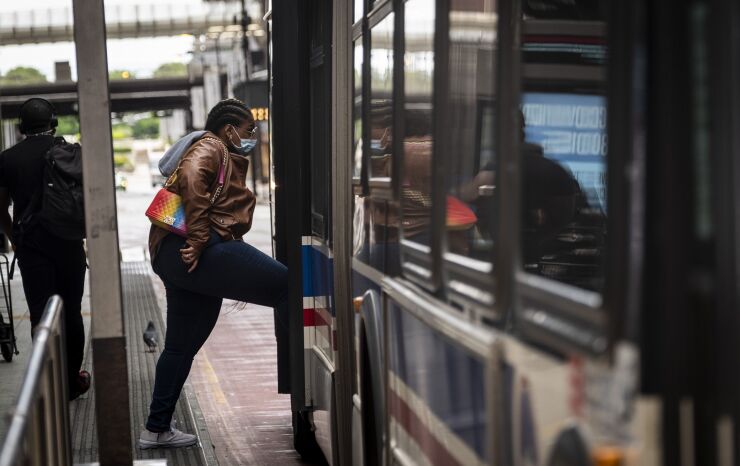The Chicago Transit Authority is coming to market with $880 million of new money and refunding sales-tax backed bonds after amending its COVID-19 battered budget that remains on track thanks to federal aid.
The timing of the deal or planned use of its proceeds is not related to the coronavirus pandemic, the authority says.

"We had the new money bonds in our 5-year Capital Improvement Plan, well before the pandemic began. The refunding bonds are taking advantage of current favorable market conditions," the CTA said in a statement.
An A series for $345 million of 35-year tax-exempt, second lien sales-tax backed bonds carries an A-plus rating from S&P Global Ratings and AA-minus from Kroll Bond Rating Agency. Siebert William Shank & Co. LLC is senior manager.
The B series for $538 million of taxable, senior lien refunding of sales-tax bonds carries AA ratings from both. Goldman Sachs is the senior manager.
Both ratings have a negative outlook.
Principal is repaid on the A series from 2041 to 2055 and the refunding bond principal is repaid from 2021 to 2040. The B refunding will repay 2011 bonds for savings and pay off capital notes and generate savings. The proceeds are also capitalizing interest. Both are slated to sell later this week.
The new money will help fund the CTA’s fiscal 2020-2024 CIP totaling $5.1 billion. Projects in line for funding from the deal include bus and rail car purchases, O’Hare International Airport line signal upgrades, the ongoing Red Line expansion, and Red-Purple Line modernization.
“These projects will allow CTA to maintain or reach a state of good repair and reduce future maintenance costs,” the CTA says in an investor presentation.
On the capital front, the agency received a boost from the state’s new $45 billion capital plan approved last year. The CTA over the next five years will receive $1.2 billion of state support as well as $709 million in new recurring funding from an increase in the state gas tax and vehicle registration fees indexed to inflation.
Ridership has plummeted and remains depressed as many businesses, especially in downtown Chicago, continue to keep employees working from home, deeply denting farebox revenue. Sales tax dollars that makeup much of the agency’s public funding have tumbled.
The CTA has lowered ridership farebox revenue by 64% while public funding was trimmed by more than 30% for the year but it’s avoided cutting service or raising fares by using its share of federal funding from the CARES Act for coronavirus relief.
“This has provided us a significant lifeline for the 2020 budget,” CTA Chief Financial Officer Jeremy Fine told the board at its August meeting.
The CTA provides rail and bus services to neighborhoods throughout the city and to 35 surrounding suburbs and is the nation's second largest transit system by ridership. It’s funded by farebox, other system-related revenue, and a share of receipts generated from a sales tax imposed in Cook County and its five collar counties as well as a portion of the city’s property transfer tax.
At the agency’s August meeting, the board amended its 2020 budget upward to $1.59 billion from $1.57 billion. Fare box revenue was revised down to $211 million from $586 million with overall system generated revenue now expected to total $292 million down from a budgeted $696 million. Public funding was cut to $610 million from $875 million.
CARES funding will make up for the shortfall. The agency is receiving $817 million from the package signed March 27 and has used about $177 million so far. It anticipates using a total of $690 million to cover a 2020 shortfall.
The agency is trying to keep costs in check to preserve as much CARES funding into 2021. It expects about $127 million will be carried over into the budget that will be released in October.
“The CARES Act funding that we currently have in place… will carry us into the first quarter of the next year. And so nothing this year will be negatively impacted by the pandemic and loss of ridership. Next year could be a very different story depending on what Congress does,” CTA president Dorval Carter said at the agency’s board meeting when asked about the prospects for additional funding.
Negotiations between the Trump administration, the House Democratic majority and GOP Senate majority remains stalled but Carter said he is hopeful of eventual federal action especially given the dire warnings over its future operations laid out by the state-run authority which operates New York City’s mass-transit system and its projections of a $12 billion deficit through next year.
CTA is one of three service boards that serve Chicago and its suburbs along with Metra commuter rail and Pace suburban bus service. The Regional Transportation Authority of Illinois provides fiscal oversight.
The leaders of all four issued a joint statement late last week calling for $32 billion in federal transit help to supplement the $25 billion provided in CARES. The CTA, Metra and Pace received a total of $1.4 billion.
Despite the steep revenue and ridership blows, CTA opted not to cut service to allow essential workers to get to their jobs and also to keep busses and trains less crowded to promote social distancing as it’s a primary recommendation of health experts as a means to prevent the transmission of COVID-19.
"The ratings reflect the application of our '
In March, S&P revised its outlook to negative from stable on several long-term and underlying ratings on mass transit agencies secured by priority lien tax revenue pledges including the CTA.
In April, Kroll lowered its CTA outlook to negative from stable.
“The negative rating outlook reflects the uncertainty regarding the magnitude and tenor of the impact on sales tax revenues due to the COVID-19 crisis and the duration of recessionary conditions,” Kroll said.





